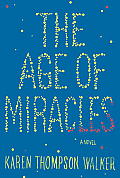
To write fiction, said
Virginia Woolf, a woman must have a room of her own. But as a young writer in Brooklyn who for years shared a small studio apartment with my husband, a room of my own was a luxury that my bank account could not support.
For almost five years, the two of us shared 350 square feet of space: fifteen floors up, one room, one window, one door. These were years when I did not even have a desk of my own. Instead, my husband and I — both of us writers — took turns sitting in our only desk chair, which, if you backed up too quickly, would slam into the nearby bed.
I was working in book publishing at the time, answering phones all day and editing other people's books on the weekends and at night, so I felt squeezed in two senses: in time just as much as in space. For most people, of course, this is what it means to be young in New York.
For me, it was the lack of time that bothered me much more than the lack of space. So many of my hours belonged to other people. Any minute I managed to spend alone felt surprisingly precious, like a small rebellion.
Maybe that's why a certain piece of my day came to feel so important to me during those years. It was a slim wedge of time, a brief hour each morning before work, 60 minutes of quiet, when I was free to write, to chip away at my novel. The only cost was my sleep. Instead of a room of my own, I found an hour.
At least, I always aimed for a whole hour.
I often fell short. Sometimes I'd stayed out too late the night before, drank too many glasses of wine. Sometimes I only had half an hour. Sometimes I was lazy. Sometimes I wrote standing up on the train to work, balancing my laptop with one hand. Some days I wrote only one sentence, just in my head, as I walked from my apartment to the subway.
To me, my progress seemed painfully slow. I remember when I hit 30 pages. I'd never written anything so long in my life. I remember when I hit a hundred.
Years passed, but I kept working on the novel every morning. I changed jobs. I got married. I changed jobs again. (I stayed in the same studio apartment.) By the time I was writing the end of the book, I had less free time than when I'd started.
It took almost four years. What I had written was a short book, but it had a beginning and an end, and 243 pages in between. It was the story of a young girl who wakes one morning, along with the rest of the world, to the news that the rotation of the earth has begun to slow, stretching the length of the 24-hour day.
In total, I must have spent hundreds of hours on my book. But even more important were the nooks and the crannies of days, the subway rides, the half-hours, the minutes.
No wonder I wrote a book in which, quite literally, there really are more hours in a day.